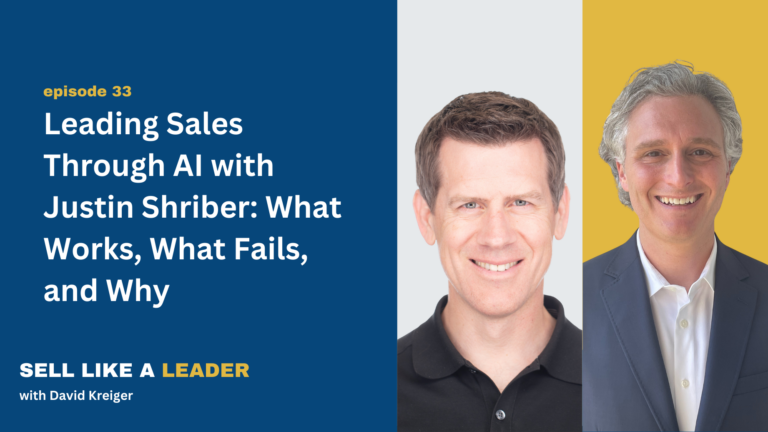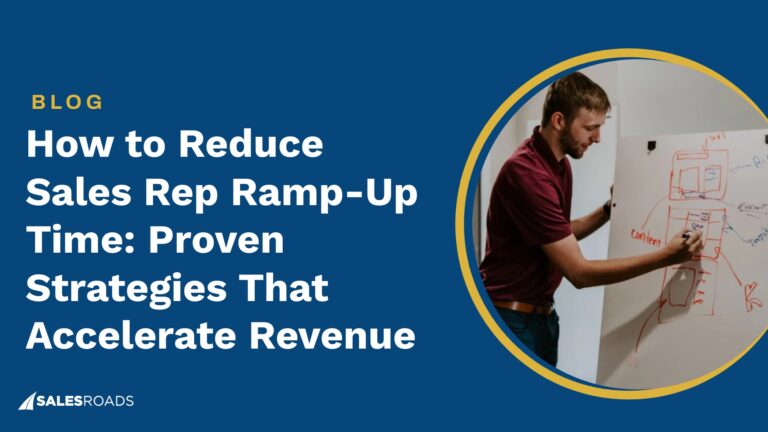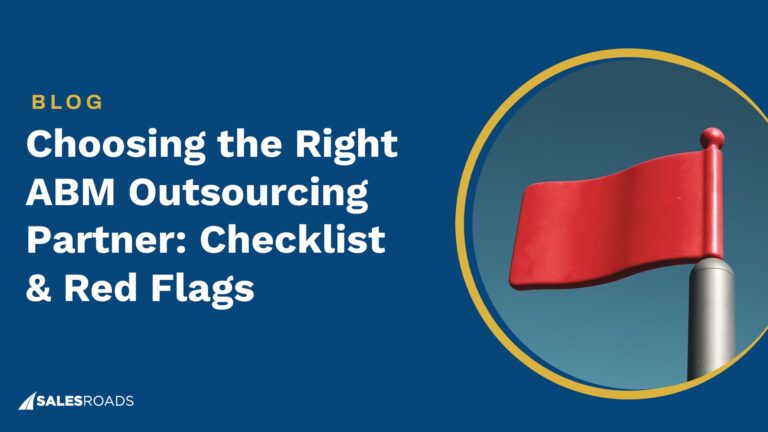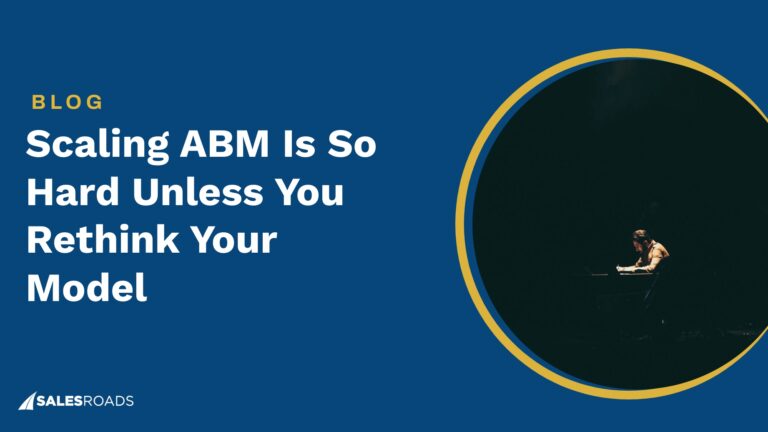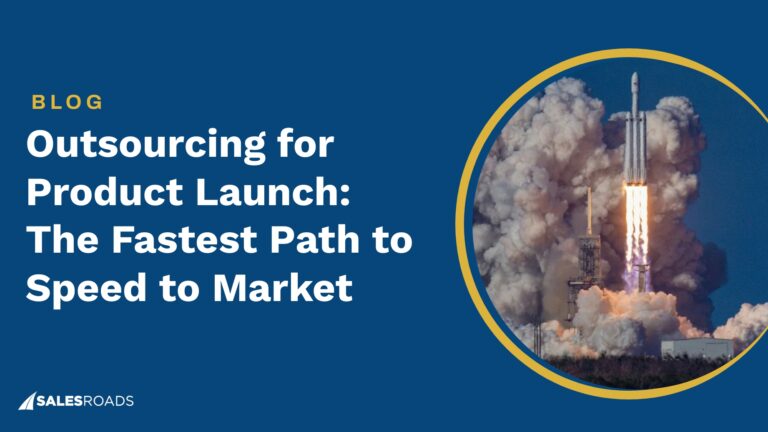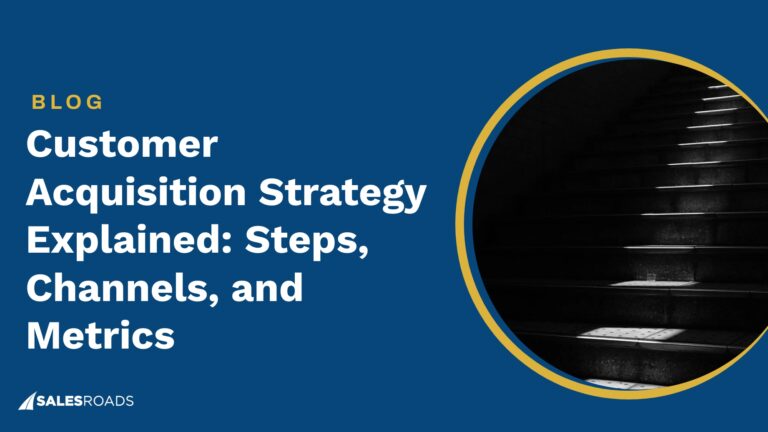Sell Like A Leader – Episode 1
This episode provides practical advice for both new and experienced sales professionals to excel in today’s sales environment:
– How can technology help you sell better without losing the human touch? David reveals how he uses AI at SalesRoads to understand his clients better but not to do the selling for him. Find out why he thinks AI is a great tool but not a substitute for human salespeople.
– What does it take to have a positive mindset in sales? David shares his secret weapon and how a simple habit helps him cope with the challenges and stay resilient in sales. Learn how to use this technique to overcome the highs and lows in sales.
– Why is consistency the key to success in sales? David talks about the importance of having a daily routine and sticking to it. He also discusses how managers can support their sales teams with regular coaching and feedback. Discover how to improve your performance and achieve your goals with consistent practices.
– How can you grow and learn as a salesperson? David shares his favorite resources for gaining new knowledge and insights on sales strategies. He also emphasizes the importance of self-investment and personal development.
About David Kreiger
In this first episode host David Kreiger, with 20+ years in sales, dives into key sales and leadership strategies for 2024. He reflects on evolving sales trends, especially with AI, and stresses the importance of personal growth, resilience, and consistency.
Connects
Follow David Krieger on LinkedIn for top-notch sales tips and insights, subscribe to the podcast, and follow our Podcast LinkedIn page to learn from other sales leaders.
See you in the next episode with our first guest!
Transcript
David: Hi, my name is David Kreiger, and I am excited to launch the Sell Like a Leader podcast. I've been in sales for 20-plus years, and it is a roller coaster ride.
Lots of highs and lows, so much to learn. And even after 20 years, I am still learning every single day from sales leaders across the world. And so, I thought it would be great to be able to invite some of those sales leaders that I really respect, that I've been learning from, and I continue to learn from throughout my career, and have them on the Sell Like a Leader podcast.
So I can ask them some of the questions about their sales journey, about their management journey, about their personal journey, about the highs, the lows, the challenges that they've overcome, or maybe haven't yet overcome.
And we'll be able to [00:01:00] grow over the course of 2024 by learning from each and every one of them.
Today, though, on the Sell Like a Leader podcast, I'm going to start with myself, and this is the beginning of 2024. So I always find it's a great time to reflect on the year and the things that I've learned personally that have made me a better salesperson, a better leader. I'm going to reflect some of those back to you over the course of this initial podcast.
There are four main things that I'm reflecting on in 2024, and I'll be honest, they are similar to things I've seen in past years, and that's one of the amazing things about sales, about business, about life.
A lot of times, we tackle issues, think about issues, and though they might be in a different iteration this time around, they rhyme with a lot of the things that we've seen before. The first thing that I saw a lot in 2023 is that the sales community wants to find the easy button [00:02:00] in sales. They want to have a button where they press it, and sales magically fall out of the sky.
They hit their quota, and they can sit back, not have the day-to-day stress that we often do as salespeople. I think you guys all know what I'm referring to in 2023, and that's AI. I think a lot of people have this conception that AI is going to solve all of their problems. It's going to make their life easier.
It's even, people claim, it's going to sell for them. But we've seen this show before a lot of different times. And with every new technology, sales absolutely changes, adapts, I think becomes more dynamic, often more competitive, but it still comes down to the salesperson.
So, one example in years past is sales automation tools.
And we saw the promise of these—of Outreach and Salesloft to name a few. And they are amazing tools. But what's happened is a lot of salespeople think that it's the tools that are going to sell for them. That's where we actually I think [00:03:00] find technology being counterproductive, at least in selling, because we are maybe sold on—we see the promise of these things doing the work for us or a good part of the work for us—and then we quite frankly get lazy in sales.
But what we need to be able to do is lean into these technologies, be able to leverage them to help us to be more effective, be more productive, but always with the mindset that it all comes down to you as a salesperson to execute, to leverage the tool in the right way, to understand your prospects, to engage with your prospects, to follow up with your prospects, to learn from your prospects, and to have your prospects learn from you. But it is not the tool's job to do that for you.
And I think that this is going to be played out tenfold with AI. AI is an amazing tool. And there are a lot of promising technologies that are saying they're going to write all your emails for you and respond to the emails and things like that, but I think that those things could be actually more [00:04:00] counterproductive because of the mindset, and that doesn't mean you can't use AI to do some customization in some of your outreach, especially when you have a large TAM.
But if you look at it through that mindset where you're trying to figure out how to automate you, quite frankly, out of the process, you're going to make yourself so much less effective.
You're going to miss the purpose of the tool. And I'll be honest, you're going to automate yourself out of a job.
So, as sales leaders, I think it's our job to think about what these tools can do to augment, to enhance our sales processes and curate those for our sales team, because it's overwhelming. It's overwhelming, but that is our job as sales leaders—to figure out the tools that make us more productive and help our team figure out ways to be able to leverage them in a way that will make them more effective.
So, a few examples—for instance, at SalesRoads, we have leveraged AI to help us build our programs.
To help us when we bring a client in to understand them more deeply, to understand their ICP and [00:05:00] then to leverage that to test and figure out messaging.
And so what we've done is we've built a series of prompts for ChatGPT to help us do research on our clients, to help us do research on their ICP, and then leverage it to engage with ChatGPT to then ask questions of it.
So once we've understood who the ICP is for our client, we will ask questions of that ICP, even potentially engage with that ICP through the chatbot, to allow us to immerse ourselves in our client's world and our client's customers.
That's something that just wasn't possible before AI, but allows us more quickly to get a deeper understanding of our clients and their clients and then leverage that to iterate messaging.
We don't ask ChatGPT to just build our messaging and build our cadences. We brainstorm with ChatGPT. We'll talk about the value prop, we'll talk about the [00:06:00] ICP, we'll ask it for some messaging that might resonate with that ICP, and then we tell it what we like, what we don't like, we edit certain parts, and it's basically like an assistant that we now all have to be able to create the best messaging possible and the best programs possible.
So that's one example of how we use it for our clients as salespeople. In part of our sales program, what we've done is allowed us to be able, for instance, in discovery calls to go much deeper, more quickly with a prospect that we haven't met yet. So if we have a basic understanding of who we're meeting, again, we're going to use ChatGPT to be able to ask it questions about that company.
We'll feed in the LinkedIn profile, we'll feed in the website, we'll feed in some of the LinkedIn profiles of the people we're meeting, and then we'll ask some questions around it. What are some of the things that they might be trying to achieve by engaging with SalesRoads? What are some of the challenges that they might [00:07:00] have?
What are some recent news articles that might give us an insight into why they are wanting to invest in sales development? And so it basically allows us to put our research on steroids and be able to do a mini discovery call with our prospect before we even start that discovery call.
So AI is a great tool to be able to go deep, to be able to understand prospects in ways we couldn't unless we're actually on the phone with them.
But it does not, by any means, replace both interaction with the AI that the salesperson has to do back and forth to internalize that information, also audit the information. It's sometimes not right. We all know that it hallucinates, right? But then it makes our personal human interactions with those prospects that much more meaningful.
And you can do this in prospecting as well. So our team can really quickly ask some questions, load in, to be able to do bits of research before a prospecting call, have a few prompts [00:08:00] to create a hypothesis as to what that prospect might be interested in very quickly.
Whereas before it would delay your calls and you'd have to spend a half hour doing research.
So these are the types of things I encourage sales leaders to experiment with. Think about how you augment them into your sales process, but do not think of AI as a replacement for sales interaction and salespeople, and that it's just going to automatically make sales fall out of the skies.
If you have that mentality, it's going to hurt you and your organization, your sales process, make it more difficult for you to hit quota than if you didn't have the tool to begin with.
So the second thing I've been reflecting on about 2023 is when we think about sales tools and we think about technology and the tools that might make us more effective as salespeople or sales leaders, it's often not the technology itself. It's working on you and your mental state and how you approach the day-to-day of your sales management, of your selling.
Because what we've seen in 2023—it was a challenging year for many folks, especially selling in the SaaS community, because budgets were tighter. VCs were making sure that every dollar was being spent in an effective way.
And so it was more challenging to sell. And as salespeople, it's very lonely sometimes, right?
We might, if we're prospecting, if we're SDRs, you might be calling a whole day before you get one appointment, right? So that's a lot of rejection. That's a lot of difficulty before you get something positive.
As AEs, we might go a few days, a few weeks, a month, or two without a sale, depending on your sales cycle.
That is really hard. And a lot of times, we can just get into that funk and get into that mindset where we feel the sales are just never going to appear again.
But I would say the best salespeople are able to keep that positive mindset, are able to protect their attitude, are able to really stay motivated every single day, and have [00:10:00] perspective.
And if you can maintain that perspective, that will be the most important sales tool that you have in your arsenal. More important than AI, more important than your cadence tool, even more important than a really good target list. It is that mental toughness, and I've seen it time and time again with salespeople—the best salespeople just can find a way to always stay motivated.
So, one tip that I found in 2023 that was really helpful for me is to keep a five-year journal. And so what is that? That is a journal where it keeps tally of the things that I wrote down over the past five years. So it's a one-line-a-day journal.
At night, I write a few statements about something that I went through both professionally and personally, how I'm feeling—good, bad, indifferent.
And I write it down, and the magic happens. As you start progressing each year, because you can look back on that exact day as to how you were feeling, what you went through, what were some of the challenges you were [00:11:00] having.
And it's cool. It's the end of that story, you might've been stressing about not hitting quota, that you were close to the end of the month, and you just weren't sure you were going to hit quota.
Maybe you were worried about getting fired and the stressors that were keeping you up at night. A year later, you know how that story ends. And most of the time, I would say, those fears were unfounded or were too strong. Either you pulled sales out of your hat, right? And you ended the month or quarter strong.
Maybe you were worried about losing your job, and you didn't lose your job. Or maybe you lost your job and you've now, a year later, found something you love even better.
And more often than not, that is how the story ends. And I think Mark Twain said it. Most of our fears never came to be, and I just butchered that quote, but I think you get the gist of it because that's what I find.
I find I stress all the time. I am up at night, in the middle of the night, worried about a client. Proposal, [00:12:00] something with my family.
And when I look back on that journal, I'm going like, that wasn't a big deal. Why was I so worried? Why was I wasting my mental energy, my time on that type of stressor?
And it's just not easy to do. Sometimes we think we can just snap our finger and be like, okay, I'm being stressed, this is silly, I'm going to move forward. Something, it's a muscle you have to exercise. Some people use meditation.
That's great. There are other things you can do, but I find that having perspective, especially perspective on your own life, but also we're going to see over the course of this podcast, perspective from our peers and things that they went through.
And when we hear from them. The challenges that they went through, they're similar things that we went through. And the things that we fear, come across, worry about, work on, are not unique. And to me, that is super powerful. To help me get perspective, to help me lower my anxiety when I'm feeling it, and when you can keep that even-keel perspective.
That's how you can be your best every single day, showing up for your prospects, your [00:13:00] team, your family. And for me, that is something I continue to reflect on coming out of 2023 that is super powerful.
The next thing that I think a lot about is consistency. And what I find is that the best sales leaders, the best salespeople, are consistent in the way that they show up every day and in their processes, and they don't jump around.
It's the inconsistency that drives us both crazy, but also is counterproductive because we can't get into a flow. And also for managers, it's important to show up consistently for those who we work for and who work for us.
So let me break that down a little bit. So for a salesperson. You've got to be consistent every single day.
You got to put in your calls. You got to have enough prospecting calls.
You've got to build enough pipeline. You've got to have enough discovery calls, and you've got to organize yourself so that you can every day put in that effort, make the calls, prep for your discovery, send out your proposals.
Do your follow-up. And I urge you, this is not [00:14:00] unique, but set up your calendar, right?
And make sure that you have your time blocks and you have your goals for the day. Every single day I have a little journal on my desk and I write out exactly what I'm going to do over the course of my workday. So it is pre-planned.
And I write down my three most important things that I'm going to get done.
And when I'm prospecting, I create my metrics. How many dials, how many conversations, how many appointments am I going to make? You have to have direction, and then you got to show up consistently.
For managers, it is the same thing. A lot of times, we can get into a tizzy, and we're going to go in this direction.
We're going to try this tool. We're going to try this prospecting strategy, and we're going to be frenetic.
Our team demands consistency in the way that we show up every day, or else they're going to go into a tizzy. So you got to organize yourself.
You got to organize the meetings that you have, the checkpoints, the number of coaching sessions, when you're going to have those coaching sessions.
So your team knows that you can't just jump in and out of coaching and say, oh, we haven't had a coaching in a while. Let's do a coaching session.
Be consistent. I encourage you to do coaching [00:15:00] sessions every week with your team, but if you're stretched, you have a lot of people, every other week, whatever the cadence is. How many calls you're going to listen to a week, when are you going to do your call listening?
When are you going to do your ride-alongs? Be consistent, and it will be that consistency that will allow you to help your team every single day, move towards the goal that you guys have established or has been established for you.
So I would really urge you to think about how to be consistent in your day.
Look at your goals, just to scroll back a little bit. What I do is I look at my goals on a yearly basis. Then I break down my quarterly goals.
So, what are my three quarterly goals I need to have to hit those yearly goals? What are my weekly goals? And then what are my daily goals? And then what are the activities that are gonna get me there?
Lastly, and this goes back to part of the reason that I wanted to start the Sell Like a Leader podcast, I have seen, and I really pushed in this in 2023, how important it is to invest in yourself.
And I know a lot of people say that, and we think about it. [00:16:00] I found, at least for myself, building SalesRoads, being an entrepreneur, having to sell, manage people.
Often ends up on the back burner is my investment in myself. Other things always end up taking priority.
And I can't tell you how much of an ROI I've gotten when I actually consistently listen to podcasts, listen to webinars, set up networking calls, which are exploratory. And just I'm looking to learn from them, having a book that I'm reading on a specific topic.
I have been able to reinvent my business by taking those moments out. And allowing myself to learn from my community and the sales community, might be true in other communities as well.
There's so much great content out there. There are so many great people to learn from who have gone through the same things you've gone through, who are maybe experimenting with the same things you're experimenting.
There are so many great podcasts — hopefully we'll be one of them — who can help you to sell like a leader.
And when you take time to learn from those people, it's [00:17:00] so many doors open up. We implemented a whole new technology to help us improve our workflows, improve the way that we target leads and prospects, making both our backend sales ops so much more efficient while increasing our metric for bad data simultaneously, just because I listened to one podcast by John Barrows, Make It Happen Monday, where he had Eric Nowoslawski and Varun, who talked about an amazing tool called Clay.com.
And I'd never heard of it before, but just by listening to that, I got insight into a technology that helped to reinvent my business, helped my team to do things more efficiently and more effectively.
And I wouldn't have gotten that if I didn't take, I think it was 30 minutes, to listen to a podcast.
And I would argue you'd get something out of every podcast, but even if you don't, even if you get one nugget out of every three, those nuggets are so valuable.
Because you're capitalizing on learning from other people and they're spending lots of time trying to learn, and you're crowdsourcing [00:18:00] ideas on ways that you can improve as a leader, how you can improve your organization, how you can sell more effectively.
With that, I'm going to bid our first podcast episode adieu. I appreciate you taking the time to join us here for our inaugural podcast.
I hope you use Sell Like a Leader podcast over the course of 2024 as a way that you can invest in yourself, in a way that you can learn tips from amazing sales leaders across the globe to help you become a better sales leader, become a better salesperson, and become a better person in general.
So again, my name is David Kreiger. I'm President of SalesRoads. I'm super excited to host this podcast and I look forward to podcast number two with a very special guest, where we're going to dive into some amazing topics.
It will be an amazing first guest podcast.
So thanks so much.


